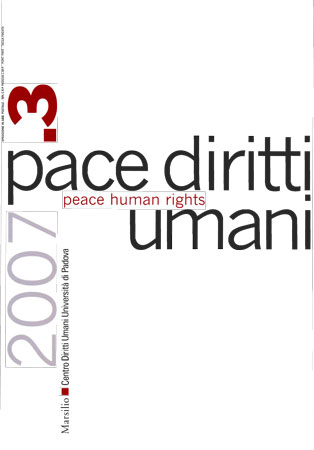Raccolte

Cittadinanza e riforme politiche in Egitto: quale ruolo per le donne?
- Contenuto in
- Pace diritti umani - Peace Human Rights, 3/2007
- Tipologia pubblicazione
- Articolo / Saggio
- Pagine
- 123-148
- Lingua
- IT
Citizenship and Political Reform in Egypt: What Is the Role of Women?
Erika Conti
In the construction of citizenship in the Arab region, the fully inclusive political participation of women represents a crucial variable for debate. Citizenship implies membership in a political community, guaranteeing equal civil, political and social rights or responsibilities. In the last few decades, Arab states have not been able to build a real political system based on equality and justice, and thus to assure full citizenship. Nevertheless, states have been recently involved in formal political changes where «free and fair» elections have turned as a trend in the region. Although the latter are often criticised as being merely formal, currently Arab governments seek a deeper involvement of «free voters» to reinforce their political authority. Can citizens’ votes and parliamentary representation, commonly recognised as consisting in a good practice in the direction of democracy, be regarded as an evaluation key for an explanatory study of citizenship? Moreover, will state initiatives be able to support citizenship and, in particular, to grant full and effective respect for all of society’s fragmented groups?
This paper will attempt to investigate the question, analysing the case of Egypt. In particular, it will focus on the recognition of women as active citizens, able to provide an important contribution to the national political process towards democracy. In the end, the paper will try to draw up a comprehensive answer to the question: in this context of political and constitutional reforms, will such new formal efforts of the Egyptian government to include citizens and, in particular, women in the political process, favour an effective implementation of the concept of citizenship for all?

